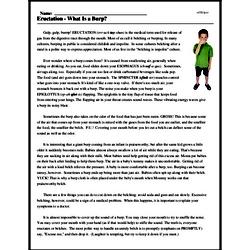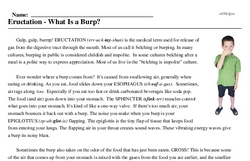Eructation - What Is a Burp?
Gulp, gulp, burrrp! ERUCTATION (err-uck-tay-shun) is the medical term used for release of gas from the digestive tract through the mouth. Most of us call it belching or burping. In many cultures, burping in public is considered childish and impolite. In some cultures belching after a meal is a polite way to express appreciation. Most of us live in the "belching is impolite" culture.
Ever wonder where a burp comes from? It's caused from swallowing air, generally when eating or drinking. As you eat, food slides down your ESOPHAGUS (eh-sof-a-gus). Sometimes, air tags along, too. Especially if you eat too fast or drink carbonated beverages like soda pop. The food (and air) goes down into your stomach. The SPHINCTER (sfink-ter) muscles control what goes into your stomach. It's kind of like a one-way valve. If there's too much air, your stomach bounces it back out with a burp. The noise you make when you burp is your EPIGLOTTUS (ep-ah-glot-is) flapping. The epiglottis is the tiny flap of tissue that keeps food from entering your lungs. The flapping air in your throat creates sound waves. These vibrating energy waves give a burp its noisy blast.
Sometimes the burp also takes on the odor of the food that has just been eaten. GROSS! This is because some of the air that comes up from your stomach is mixed with the gases from the food you ate earlier, and the smellier the food, the smellier the belch. P.U.! Covering your mouth before you let out a belch can deflect some of the sound as well as the odor.




